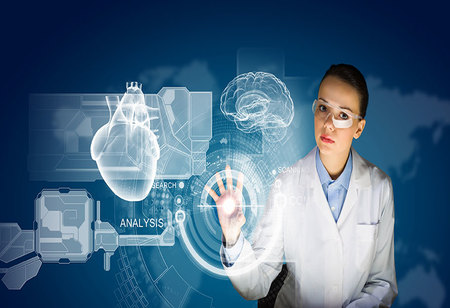
Top 10 Medical Innovation of 2020


The pandemic has brought in the uneasy times that call for newer innovations in the healthcare sector. On the other hand, the pharmaceutical companies that have pivoted to vaccine development and the biotechnology laboratories have set their focus on the development of accurate testing devices that are easy to use, fast, reliable, and most importantly cost-effective. This has induced the convergence of AI, wearables, IoT, blockchain, and point-of-care testing that have been disrupting the healthcare system but simultaneously empowering the patients that could bring out better outcomes.
Portable Defibrillator
The automated external defibrillator (AED) has invested to increase a person’s chances of survival after a sudden cardiac arrest. HeartHero’s device is present in the queue for FDA and other regulatory approval. This is a pretty handy and easy-to-use AED that weighs about 1.3 pounds and could be kept in the homes of those at high risk of heart attacks. The conductive pads on a person’s chest aids in reading the person's heart rhythm to determine whether a shock is the right course; if it is, then it gives the appropriate amount of charge and then reexamines the rhythm to determine if more attempts are necessary.
MedWand
MedWand, a clinical-grade diagnostic kit, that enables the doctors to gather the information that could be obtained only when the person visits the clinic. The diagnostic kit is as small as a coffee mug, which is connected to the USB-connected setup gives a physician real-time access to data that include a stethoscope, an otoscope, an ophthalmoscope, an ECG sensor pulse oximeter, dermatoscopy as well as a thermometer. However, the device is awaiting FDA clearance.
Reusable, N95-Quality Mask
Pandemic has introduced us to the mask, thus the new personal protective equipment (PPE) was in critically short supply. Without a standardized method for reusing and cleaning PPE, the CDC recommended that required workers rotate their masks every five days, storing them in breathable paper bags in between, resulting in reduced efficacy.
Super Fast Insulin
People with both type 1 and type 2 diabetes rely on insulin to stabilize spikes in blood-sugar that hit after meals, and failure to control those glucose jumps increases the risk of other ailments, including heart disease, kidney failure, and nerve damage. Conventional insulin injections have fairly narrow windows in which theycould be used to work properly, but patients can take Lyumjev anytime within 20 minutes of starting a meal.
Alzheimer’s Detector
A definitive diagnosis needs a clinical evaluation as well as brain imaging or a spinal tap. So it’s huge data that scientists have found a simple blood test that has accurately diagnosed Alzheimer’s in early studies. If the test, which hunts for proteins indicative of the disease, performs well in additional studies, it would give the first easy, early screen for this debilitating disease.
COVID-19 Kit
The COVID kit would be of the toaster-size device that works by heating nasal samples in an acidic solution that breaks open the envelope of the viruses, exposing their RNA, that ID NOW amplifies at a constant temperature rather than the heating and cooling cycles that PCR machines use. Gaining emergency authorization from the US Food and Drug Administration in late March, the COVID-19 ID NOW test was one of the first tests accessible to the US public.
Wearables, & the Internet of Things
Many of us have used internet-connected devices to monitor our health but in the past, we were left to make our own inferences from the data generated. Wearables are adding more and more sensors and they are getting so accurate that doctors can rely on them.
Modern wearables are very different; fitness trackers have detected and alerted wearers of cardiac emergencies thereby saving lives, some wearables help in improving sleep, and others coach athletes to perform optimally.
Myopia
Myopia, for near-sightedness, occurs when a person’s eyeballs extend too far out of the socket, which makes it difficult for incoming light to focus on the retina. The common condition can get progressively worse as a person ages and that ocular elongation extends. In studies, the lenses reduced the progression of myopia by 59 percent over a three-year period. The daily lenses stall elongation by creating what’s called “myopic defocus;” light that hits the periphery of the retina is redirected to its front, inhibiting the growth that degrades vision over time.
Smartwatch for Sleep Apnea
Obstructive sleep apnea is a disorder that helps muscles that keep our airways open relax during slumber, narrowing the flow and causing periodic gaps in breathing. However, Pulmonologists estimate that some 80 percent of average to critical apnea goes undiagnosed. The new ScanWatch from Withings is an early-warning system that can signal when a trip to the doctor for a full-blown sleep study might be in order.